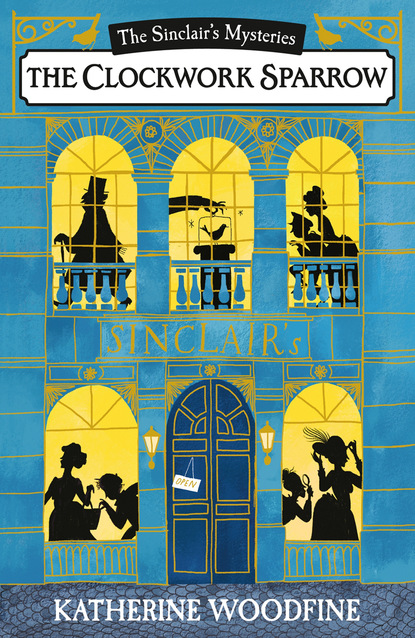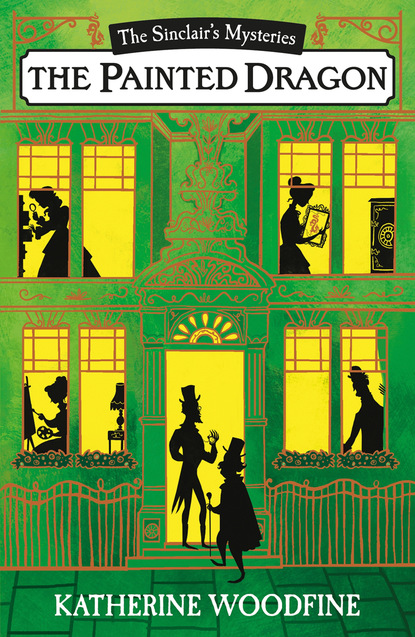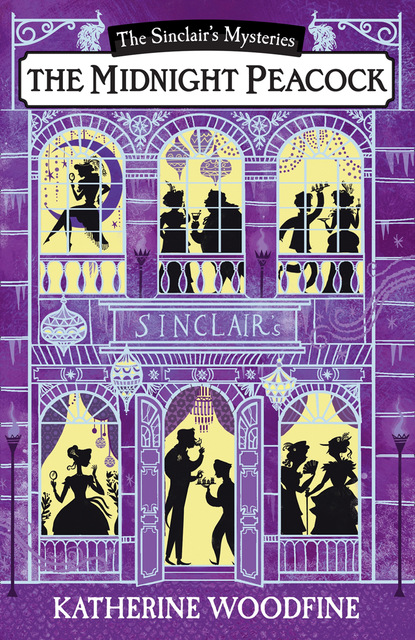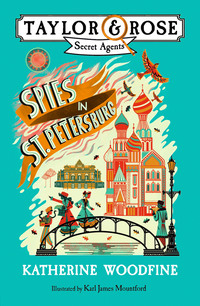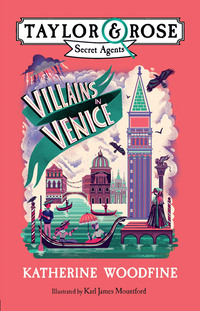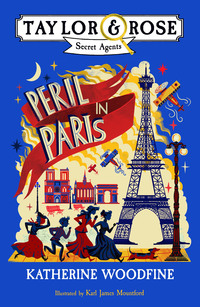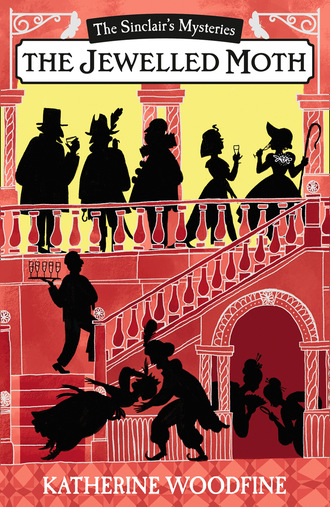
Полная версия
The Jewelled Moth
‘Course,’ said Mei, surprised.
‘Only for your father, mind. Keep mum: not a word to anyone else. Not even those rascal little brothers of yours.’
Mei nodded, increasingly puzzled.
For a moment, the cobbler hesitated. Then, even more quietly, he said: ‘Tell him he’s in the soup.’
‘What?’
‘Up to his neck in it. He’ll know what I mean. Now run along, my dear, and mind how you go .’
He said the last words with a particular emphasis. It was not an ordinary run-of-the-mill farewell – he was warning her about something. She had not the faintest idea what the warning might mean, but in spite of the warm day, a sudden chill crept over her as she left the shop.
The docks that had seemed so lively felt different now. Sailors and stevedores jostled past as she hurried back towards China Town. One man, already drunk, staggered out of an inn doorway into her path then dropped his bottle on the ground and began cursing angrily. She dodged away, but then a little gaggle of children crowded around her, the smallest pulling at her frock to distract her while another’s dirty hands snaked inside her basket. But Mei had not lived her whole life in the East End for nothing. She knew what to do: she pushed the thieving one away, scowled at them all and thundered, ‘Leave off ! Or I’ll set the constable after you!’ in her loudest voice, until they scattered into the crowd.
Her heart bumping now, she walked as fast as she could back to China Town. She did not run. She knew that to run would be to appear frightened and to appear frightened was to be weak, but with every step, the words of the cobbler’s warning were ringing in her ears as loud as the bells of Bow Church. He’s up in his neck in it. In the soup. Mind how you go.
She plunged through the shop door, making the bell clamour loudly, but then stopped dead in her tracks.
The shop was ruined. Furniture was overturned and the shelves had been ransacked: bottles and jars were scattered in all directions, and tins of tea and coffee had been pushed to the floor, spilling their contents. For a moment, the chaos was all she saw: then she realised that in the centre of it all was a single crumpled figure, lying like a broken puppet in the middle of the floor.
‘Dad! ’ Mei screamed.
CHAPTER TWO
All the way across the smoky city of spires and slums, in the heart of the West End, was a shop of a very different kind. London’s most fashionable department store was crowded with people: the London Season was now in full swing, and anyone who was anyone simply had to be seen at Sinclair’s.
Outside, it was a glorious June morning, and the skies above Piccadilly Circus were a perfect blue. Inside, all eight storeys of Sinclair’s department store were astir with activity. Elegant ladies were perusing gloves and parasols, whilst dapper gentlemen examined flannels and straw boaters. Giddy groups of young people were gathering around the ice-cream counter – Mr Edward Sinclair’s latest American innovation, fast becoming a favourite with London’s fashionable set. At the top of the store, stylish couples were strolling through the roof gardens, which, since Mr Frederick Whitman had chosen them as the setting for his marriage proposal to West End star Miss Kitty Shaw, were considered to be quite the most romantic place in the city. All the while, porters in smart uniforms hurried by with boxes, and the Head Doorman, Sid Parker, swung open the doors to admit more customers to the tune of a merry waltz drifting down from the gallery, where a pianist played a gleaming white grand piano.
Out in the stable-yard, there was just as much going on. A procession of vans was streaming into the yard, each piled high with crates and boxes. Many of them had come directly from the docks of the East End, loaded with cargo from all over the world. There were crates of China tea, bolts of Indian silk, and the finest goods from every corner of the British Empire. It was here that everything arrived, and it was from here too that all the deliveries went out to the grand houses of West London. Even now, another group of porters were busily preparing the next batch, each item carefully wrapped and placed inside a Sinclair’s box. The boxes were loaded into the motor vans and delivery carts, and then they flowed out again in a long cavalcade into London’s streets.
Meanwhile, above them in the store, the elevators swept up and down; the tables in the Marble Court restaurant were laid for luncheon; and in the Millinery Department, several groups of customers had gathered to admire exquisite displays of the latest summer hats – gorgeous creations all fluffy with ostrich feathers or wreathed in flowers. A stylish lady swept by, fanning herself and holding forth to her companion:
‘I do think that white is the only suitable colour for a debutante. Perhaps ivory or écru, or I could tolerate a pale mauve, but to wear anything else would be in very poor taste – don’t you agree?’
The girl walking with them was clearly a debutante herself – a young lady making her first appearances in society. She was gazing around open-mouthed, as if she could hardly believe her eyes. But her amazement was not really so very unusual; after all, Sinclair’s was the most extraordinary store in London, with its lofty ceilings painted with clouds and cherubs, the fountains in its magnificent marble entrance hall, its beautiful golden clock. But it wasn’t just the celebrated decor of Sinclair’s that made it so special. Nor was it the magnificent entertainments that Mr Sinclair always seemed to be staging – one week an elegant thé dansant, the next an exhibition of some remarkable new invention. There was quite simply something magical about the place, from the way that the very air seemed always to be scented with rose and violet and caramel and melting chocolate, to the famous blue-and-gold Sinclair’s boxes, inside which any kind of delightful dreams might be discovered nestling amongst snowy folds of tissue paper and tied with a satin bow.
Even Sophie Taylor, who had been working as a salesgirl at Sinclair’s ever since the store first opened, still sometimes found herself gazing around the store, enchanted by the beauty of her surroundings. Not, of course, that there was a great deal of time for standing around on such a busy morning as this one.
‘Deliveries for the Millinery Department, Miss Taylor!’ called a porter, whizzing by with a trolley stacked high with hat-boxes.
‘To the storeroom please, Alf,’ she replied, as she deftly whisked a hat decorated with bluebirds from the very top of an elaborate display and placed it into the eager hands of a waiting customer.
It was strange to think that today was her fifteenth birthday. A year ago, she would never have believed she would be spending it working as a salesgirl at Sinclair’s department store. As she hurried into the storeroom to fetch more hats for a group of debutantes, she found herself marvelling at how much her life had changed since her last birthday. Papa had been home on leave, she remembered, full of tales about the recent adventures of his regiment. There had been a trip to the theatre and a special tea on the lawn at Orchard House. Cook had made a birthday cake decorated with strawberries, and they had drunk her health in ginger beer. Papa’s present had been a lovely new frock – her first grown-up evening dress – and her dear old governess, Miss Pennyfeather, had given her a pretty silk sash to match. She remembered Papa smiling at her as they had all sung ‘For She’s a Jolly Good Fellow’ around the tea table . . .
For a dangerous moment her eyes began to feel hot and prickly, but she shook the sensation away at once. This was not the time for blubbing – she was a professional young woman now. Being a shop girl was hard work, and sometimes rather boring – each day the same round of taking deliveries, tidying the storeroom, recording sales in the ledgers – but she did it well, and she was proud of it. As she swept back out of the storeroom with the stack of hat-boxes, she held her head high. Papa might be gone now, but it was a comfort to know that he would have been proud of her too.
Just a few months ago, the idea of working for a living had been daunting. Life as a shop girl had seemed so difficult – and she had felt so awfully alone. But then she had fallen headlong into a peculiar adventure, and together with three new friends, had saved Sinclair’s department store from disaster. She still felt a little shy of putting it that way, even to herself – after all, ‘saving Sinclair’s’ sounded rather grand and conceited. But it was the truth, just the same. Together, the four of them had prevented Sinclair’s from being destroyed by an infernal machine – an explosive device planted by the mysterious and sinister criminal who called himself ‘the Baron’. In the process they had also helped to recover Mr Sinclair’s priceless clockwork sparrow, which had been stolen from the store.
It had been a strange and rather frightening experience – but there was no doubt that it had changed her life for the better. She had been able to use some of the reward money that they had been given for finding Mr Sinclair’s stolen jewels to move out of her horrid old lodgings and into a far nicer room. Mrs Milton in the Millinery Department had been delighted to have her back to work at the store, and the other shop girls, who had not always been especially agreeable to her in the past, had become much more pleasant. Indeed, the youngest girls had become rather awestruck in her presence, treating her quite as if she were a heroine from a story in a twopenny paper. Even Edith, her old adversary, was carefully courteous; and as for the great Mr Sinclair himself, he always had a smile or a nod for her on the occasions he passed through the Millinery Department.
Best of all, though, she no longer felt so lonely. Papa and Orchard House were gone forever, but now she at least had her friends: Lil, Billy and Joe. Like Sophie herself, they all worked at Sinclair’s. Lil was one of the glamorous ‘Captain’s Girls’ – mannequins, whose job it was to display the latest gowns, hats and shoes to the most important customers in the daily dress shows. She combined being a mannequin with performing as a chorus girl at the Fortune Theatre, and always seemed to be rushing between dress parades and rehearsals and performances.
Meanwhile, Billy had been promoted from his old position as an apprentice porter to that of office boy in Mr Sinclair’s own office. Far from loitering around as he used to do, Sophie now regularly saw him hurrying busily through the shop on urgent business for Mr Sinclair’s private secretary, Miss Atwood. He always grinned at Sophie when he saw her, but rarely seemed to have time to stop and speak. He had grown taller since the spring, and stood much straighter now: already he seemed quite different from the nervous boy who had always been getting himself into scrapes and who had needed Sophie’s help.
Joe worked in the stable-yard. Sophie saw him most mornings on her way into the store, brushing down one of the horses with his sleeves rolled up, cheerfully whistling a music-hall tune. Joe had once been part of a gang working for the Baron, and when Sophie had first met him he had been injured and penniless, begging outside Sinclair’s. He looked quite different now – well-fed and happy. She knew that having a proper job and a place to live meant a very great deal to him. She could understand how he felt: she too had known what it was like to be alone, without any way to support herself. She knew they both felt very fortunate now.
But, she acknowledged, not everything about their adventure had changed things for the better. For one thing, it had brought a new sense of danger into her life. She could not forget that she alone had caught a glimpse of the Baron. He was renowned for the prodigious care he took to keep his identity a secret: no one but his closest associates knew what he looked like, but Sophie had seen him, and because of that, she knew she was in jeopardy. Indeed, in the first few weeks after their adventure, Mr McDermott – the private detective who worked for Mr Sinclair – had instructed a policeman to escort her to and from the store, to ensure her safety. Even once that had ceased, Mr McDermott himself had called in several times to check that all was well. She had welcomed his visits: in those first days she had found herself jumping at unexpected noises, starting at the sound of footfall behind her, and lying awake at night, staring into the dark, unable to help picturing the Baron’s face looming at her out of the shadows.
But as spring had stretched into summer, there had been not even the smallest sign of the Baron, nor the Baron’s Boys – the gang of East End ruffians who worked for him.
‘Do you suppose that perhaps he didn’t realise I had seen him, after all?’ Sophie had found herself asking Mr McDermott.
Mr McDermott had frowned. ‘Who can say?’ he said, shaking his head. ‘The Baron is a hard man to second-guess.’ Then he gave Sophie a rare smile. ‘Either way, Miss Taylor, it looks as though he has forgotten about you – and I must say that I’m very relieved about that.’
Well, the Baron might have forgotten her, but she doubted she would ever forget about him. Perhaps, she thought now, as she unwrapped the hats, it was simply that he believed a mere shop girl could not possibly pose a threat to him. And in a way, he was right – he was one of the most powerful men in London, with the whole of the East End in his thrall, and she was here, spending her fifteenth birthday selling hats.
‘Here is the style with the rosettes you asked for, madam,’ she explained politely, showing the first of the hats to the three young ladies waiting by the counter. ‘And this one has a cluster of rosebuds, while this pink one is a brand new Paris model,’ she went on, with careful courtesy. At Sinclair’s, it was drummed into all staff that they must provide the very best service to customers at all times.
The smallest of the young ladies, who was dressed in an elaborately flounced gown, seized on the Paris hat at once. ‘I’ll try this one,’ she announced in a very self-confident tone, positioning herself in front of the mirror. ‘Lord Beaucastle says I look awfully pretty in pink, you know,’ she added to her companions.
The girl next to her – slender, dark-haired and rather more simply dressed than her companion – rolled her eyes, but said nothing. She picked up the hat with the rosettes and turned it over in her hands. Sophie thought she saw her eyes flick very quickly to the price, which was marked discreetly on a small ticket inside the hat-box.
‘Cynthia has one just like this,’ she said disdainfully, dropping the hat back into its box. ‘Goodness knows, I wouldn’t want anyone to think I was copying her taste.’
‘What do you think of this one?’ the third of the debutantes, who had dimples and yellow curls, asked anxiously as she tried the hat with the rosebuds. ‘It would be rather lovely for a tea party, don’t you think, Emily? With my lace tea-gown?’
‘Well, get it if you like it, Phyllis, by all means,’ said Emily, the dark girl. ‘Though I must say it’s not to my taste.’
‘I suppose you would prefer this one,’ said the first young lady sharply, as she appraised the Paris hat in the mirror.
‘Oh no, I don’t think so,’ said Emily dismissively. ‘I don’t care for pink. I’d rather that blue with the spotted veil,’ she said, nodding at a hat on display on another of the glass-topped counters. ‘It’s more stylish.’
Phyllis’s face looked shocked under the wide brim of the hat she was trying. ‘But you couldn’t possibly wear something like that!’ she exclaimed. ‘It’s so bold! We’re only just out, after all – we mustn’t look fast !’
‘Oh, Phyllis, don’t be such a prig,’ said Emily with a little laugh.
‘Why don’t you try it on then, if you’re so daring?’ suggested the first young lady, still not taking her eyes off her own perfect reflection in the mirror. Sophie thought it sounded like a challenge.
Emily yawned daintily behind a gloved hand, as if the whole situation was boring her. ‘No, I don’t think I will,’ she said coolly. ‘Really, it’s a little vulgar to buy from a department store, don’t you think? Why, imagine if someone else turned up to a party wearing the same hat as you? It would be just humiliating!’
‘Not so humiliating as wearing the same evening gown to three different parties in a row,’ muttered the first young lady. Emily ignored her, but Sophie noticed a flush of crimson appearing on her cheeks.
An uncomfortable silence fell, until at last the first young lady removed the hat and cast it carelessly down on the counter. ‘I’ll leave this one, thank you,’ she said airily to Sophie. Then she turned to Phyllis. ‘Do make your mind up. Are you going to buy that, or not? We’ll be late for luncheon if you don’t hurry.’
Phyllis hurriedly removed the hat and handed it back with an apologetic smile, and the whole party set out for luncheon in the Marble Court Restaurant, rather to Sophie’s relief. She might be grateful to have her job at Sinclair’s, but she could think of better ways to spend her birthday than dealing with bickering debutantes, she thought ruefully, as she tidied the hats away.
‘Letter for you, Miss Taylor!’
A porter approached the counter, giving her a cheeky wink as he handed her not one, but two envelopes.
‘Young gentleman friend, eh? Sending you a few sweet nothings?’ he teased, grinning as he went on his way.
Sophie ignored him and glanced down at the envelopes. The sight of the familiar, rather untidy handwriting at once made her spirits lift. She slipped behind the counter, and tore the envelope open, revealing a card with a birthday greeting on the front, surrounded by a pretty wreath of poppies and daisies and some swooping swallows. Inside was scribbled a cryptic message:
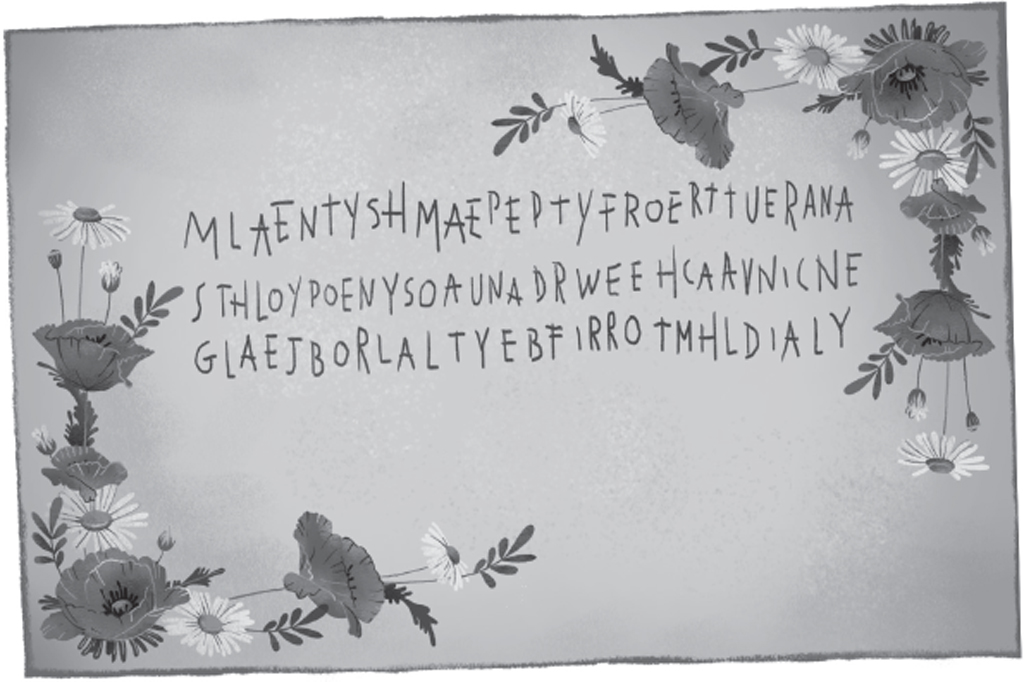
Sophie grinned to herself. She knew exactly who the birthday card was from. During their adventure, Sophie and her friends had had to decipher some mysterious coded messages, and ever since then, Lil had thought it was great fun to write the others notes in code. Sophie frowned and picked up a pencil, trying to work out this one, determined not to let Lil get the better of her. After a few unsuccessful tries, she cracked it: the secret was to read every other letter, starting with the first – and when she came to the end, to start again with the letters she had missed.
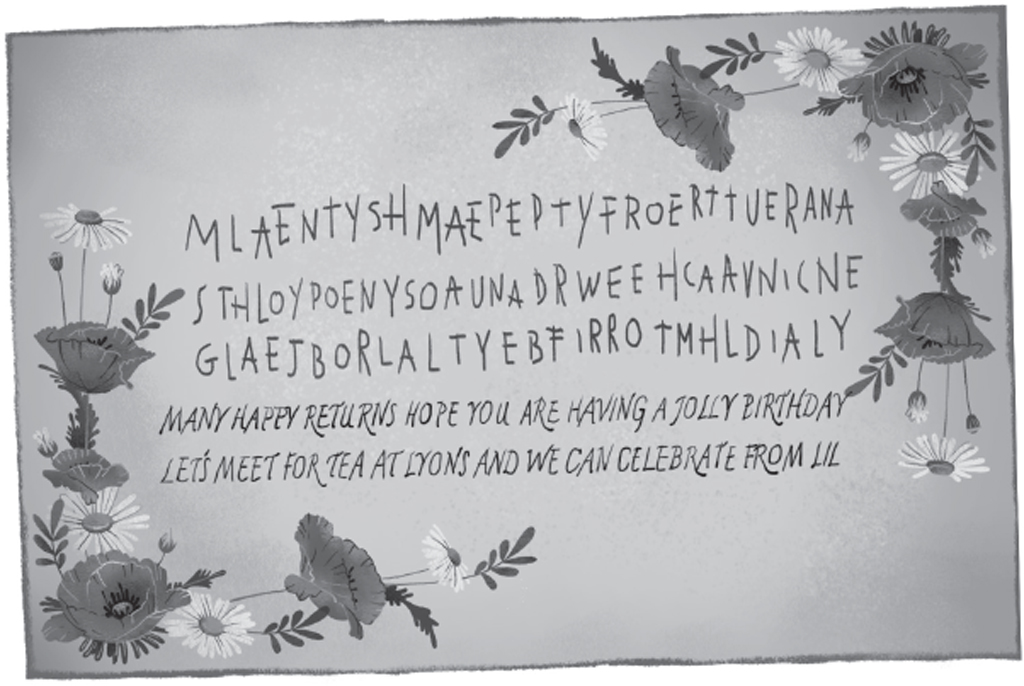
A birthday tea! The day that had stretched ahead of her just like any other suddenly seemed bright and festive. She felt altogether more cheerful as she glanced down at the second envelope – perhaps Billy had sent her a birthday greeting too?
But the second envelope did not look in the least like something Billy might have sent. The envelope was thick ivory paper, the address written in violet ink in an elegant but unfamiliar hand:
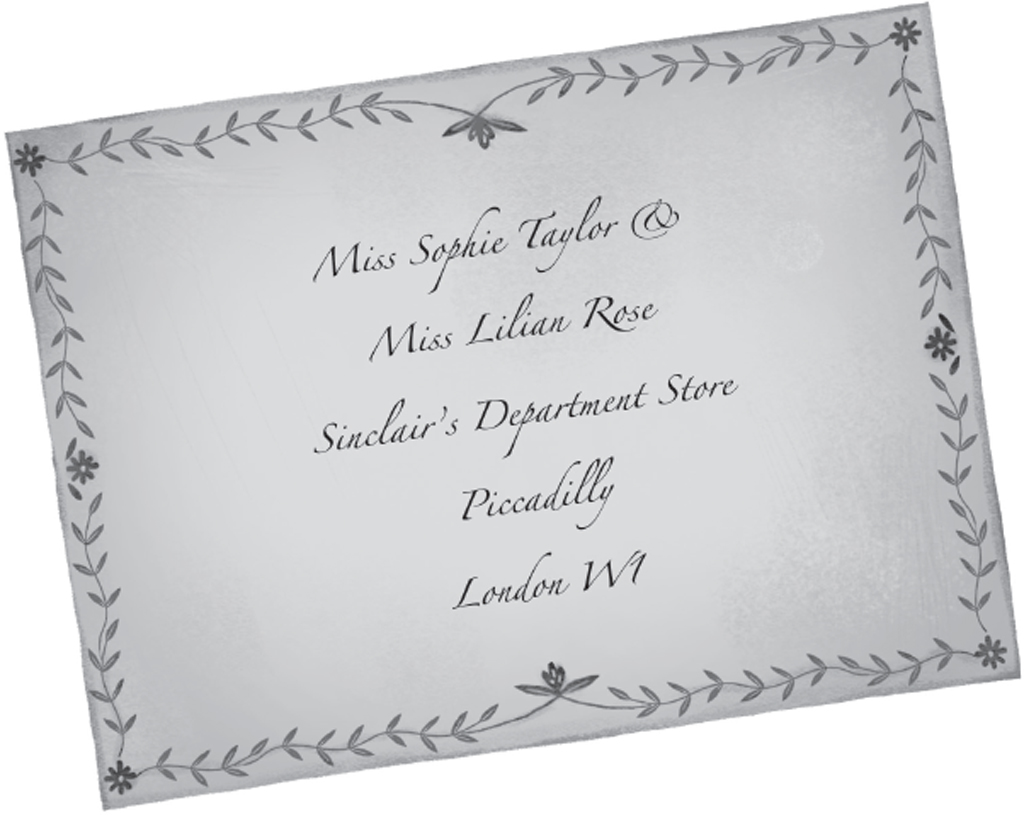
How curious! It was addressed to both her and Lil. She frowned for a moment, trying to think who on earth could possibly be writing a note to both of them. But there was no time to wonder – another customer was hurrying towards her. Hastily, she stuffed both envelopes into the pocket of her frock. ‘May I help you, madam?’ she asked.
CHAPTER THREE
Several hours later, Sophie pushed open the door of Lyons Corner House, breathing in the lovely aroma of hot buttered toast and coffee. It had been a very long day, and now her feet ached and her back hurt, but she was certainly not too tired to relish the prospect of a birthday celebration. Going out to tea was a rare treat; she and Lil would occasionally come here when they had a shilling or two to spare. It was one of the few places in London that welcomed young girls like themselves, alone, and it always gave her a satisfying feeling of freedom and independence.
She caught sight of Lil at once, sitting at their usual table in the corner. Lil was conspicuous whenever she went, being both unusually tall and unusually beautiful. Even dressed as she was this afternoon, in a simple summer frock and a straw hat with a ribbon round it, her glorious mass of rich dark hair, chocolate brown eyes and magnificent figure made her look more like a goddess than an ordinary girl. Sophie had long since got used to Lil’s remarkable appearance – but what did immediately take her by surprise was that Lil was not alone. Sitting beside her, both looking rather as though they had been starched and ironed especially for the occasion, were Joe and Billy.
‘Hullo Sophie!’ said Billy as she approached. ‘Happy birthday!’
Lil was almost bouncing out of her seat with excitement. ‘I say, isn’t this jolly? Are you surprised? Do sit down – we’ve already ordered some iced buns. I hope you don’t mind – I do think there’s something awfully birthday-ish about iced buns, don’t you?’
Even Joe was grinning at her, in spite of looking a little self-conscious to have found himself in a tea shop. Billy and Joe had each brought her a birthday card, and Lil had a present for her too – a handkerchief with embroidered corners. By the time the tea had been poured and the iced buns and sandwiches arrived, she felt quite a different person from the weary shop girl who had walked through the door.
It was the first time in two weeks that they had all been together, and they had lots to say for themselves. Billy was eager to tell them the latest about working in Mr Sinclair’s office.
‘Of course, I’m only the office boy, so I’m jolly unimportant really,’ he explained, as he shovelled a third spoon of sugar into his tea. ‘But there’s no danger of being bored, I can tell you! There’s always something going on – you should see some of the people who come to see the Captain!’
‘Lots of ladies, I bet,’ said Joe, with a grin.
‘Yes and not just any ladies, either – actresses, opera singers, dancers,’ Billy said, his eyes wide. ‘If they’re someone important, he has them sign a window pane in his office. He has a special long stick with a diamond at the end of it, so they can write their names on the glass!’ he explained, clearly most impressed by this. ‘It’s fearfully busy, but I’m learning a lot. Miss Atwood is showing me all the ropes. Then I have to take evening classes three times a week – typing and shorthand and bookkeeping.’
‘You must hear all sorts of interesting things,’ said Lil, her eyes sparkling, much more intrigued by Mr Sinclair’s glamorous visitors than she was in typing or bookkeeping. ‘All the gossip and scandal! Mr Sinclair’s deep, dark secrets.’
Billy grinned. ‘Well, I don’t know about that,’ he said. ‘I think he keeps his secrets to himself. But I’ll tell you what – I do know all about the plans for the summer fête.’
The Sinclair’s summer fête was a great source of excitement amongst the staff at present. Mr Sinclair was renowned for taking good care of his workers, and he had determined that just as London’s high society had their summer entertainments – their trips to Ascot and Cowes and the Henley Regatta – so too should his staff. He had charged the new store manager, Mr Betteredge, with planning a day of festivities for them, to reward them for their hard work during the year so far. Mr Betteredge was a cheerful gentleman, who was about as different from the previous store manager, the duplicitous Mr Cooper, as it was possible to be. Mr Cooper, of course, had turned out to be secretly in league with the Baron: he was the one who had stolen the clockwork sparrow, and might have done far worse had they not discovered what he was up to. But even disregarding all that, Sophie could not imagine that he would ever have jumped at the chance to plan a jolly day out for the Sinclair’s staff.


